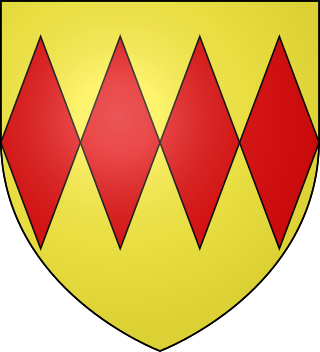
Robert II was King of Scots from 1371 to his death in 1390. The son of Walter Stewart, 6th High Steward of Scotland, and Marjorie, daughter of King Robert the Bruce, he was the first monarch of the House of Stewart. Upon the death of his uncle David II, Robert succeeded to the throne.

Walter Stewart was the 6th Hereditary High Steward of Scotland and was the father of King Robert II of Scotland, the first Stewart monarch.
The Justiciar of Scotia was the most senior legal office in the High Medieval Kingdom of Scotland. Scotia in this context refers to Scotland to the north of the River Forth and River Clyde. The other Justiciar positions were the Justiciar of Lothian and the Justiciar of Galloway.
The Justiciar of Lothian was an important legal office in the High Medieval Kingdom of Scotland.
John Comyn (Cumyn) was Lord of Badenoch in Scotland. He was Justiciar of Galloway in 1258. He held lands in Nithsdale and Tynedale.

Clan Lindsay is a Scottish clan of the Scottish Lowlands.
Holders of the office of Lord Chamberlain of Scotland are known from about 1124. It was ranked by King Malcolm as the third great Officer of State, called Camerarius Domini Regis, and had a salary of £200 per annum allotted to him. He anciently collected the revenues of the Crown, at least before Scotland had a Treasurer, of which office there is no vestige until the restoration of King James I when he disbursed the money necessary for the maintenance of the King's Household.
Patrick I, Earl of Dunbar and lord of Beanley, was a 13th-century Anglo-Scottish noble.
William, Lord of Douglas, known as 'Longleg', was a Scottish nobleman. He was the son of Archibald I, Lord of Douglas.
Sir David de Lindsay, Lord of Crawford and Ercildum, known as "the elder" to distinguish him from his son, was an Anglo-Scottish baron of the 12th and 13th century.
Robert Avenel was a 12th-century Anglo-Norman magnate. He was ruler of the small former Northumbrian province of Eskdale in Dumfriesshire, as well as Abercorn in West Lothian. He was one of a small number of Anglo-Norman immigrants to have been given a provincial lordship in southern Scotland in the early-to-mid 12th century. For some period in the 1170s he served as Justiciar in Lothian. He also had some part of the township of Innerwick. He seems to have held this of Walter fitz Alan. He passed this on to his younger son Vincent. His nephew Glai or Glay may have held part of Innerwick too.

Sir Alexander Lindsay of Glenesk was a Scottish knight banneret. Active in jousting and as a crusader he was in favour with the Scottish kings David II and Robert II.

Sir David Lindsay of Crawford was a Scottish noble.
Sir Robert de Quincy, 1st Baron of Prestoungrange, Justiciar of Lothian, was a 12th-century English and Scottish noble.
Sir Walter de Moray, Lord of Petty, Bracholy, Boharm, Arteldol and Bothwell, Justiciar of Lothian was a 13th-century Scottish noble.
Sir William de Lindsay (1155–1205), Lord of Crawford, Baron of Luffness, Justiciar of Lothian was a 12th-century Scottish noble.
Walter de Lindsay, Lord of Lamberton and Molesworth, Fordington and Ulceby, Justiciar of Lothian, Sheriff of Berwick was a Scottish noble, who held lands in Scotland and England.

Henry de Pinkeney, Lord of Weden-Pinkeney, Fulmer and Datchet in England and Lord of Crawford in Scotland, was a 13th-century English noble.

Sir James (de) Lindsay, 9th Lord of Crawford, Knight Banneret, Lord of Crawford, Kirkmichael, Wigton, Symontoun, and of many other baronies, claiming also to be Lord of Buchan, was a Scottish feudal lord.

Sir James (de) Lindsay of Crawford was a Scottish feudal lord and politician.






